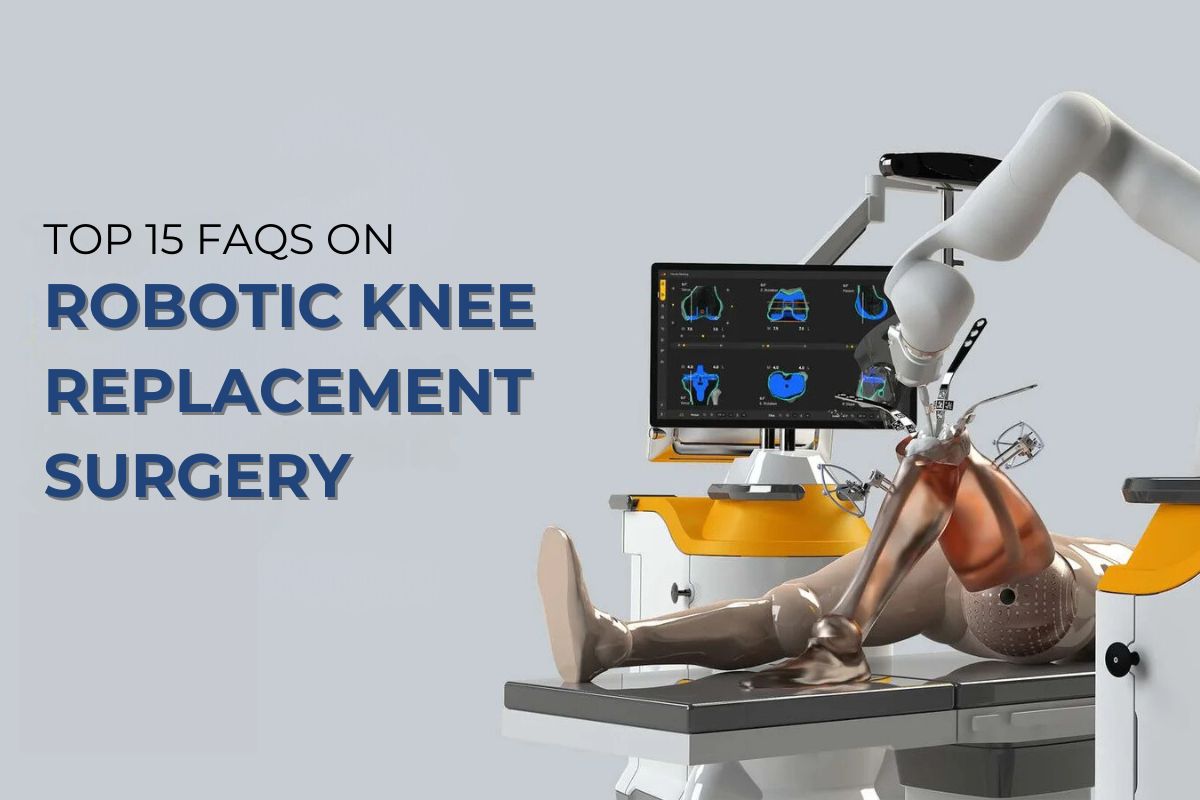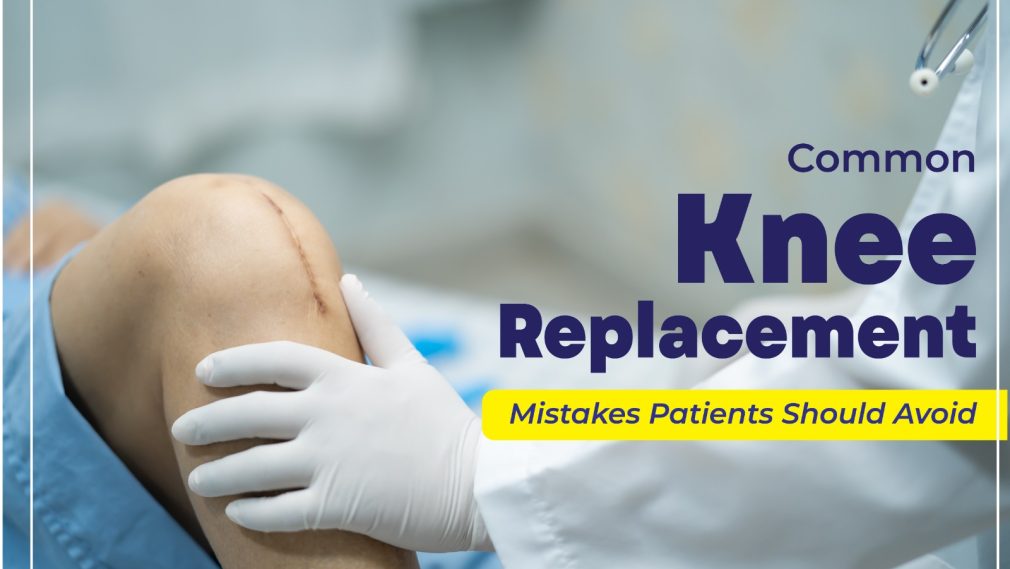Top 15 FAQs On Robotic Knee Replacement Surgery

Robotic knee replacement surgery has gained popularity as a minimally invasive option for those suffering from knee pain and arthritis. Many patients have common questions about the procedure, prompting a surge in online searches for resources like “Robotic knee replacement FAQ” and frequently asked questions on Robotic Knee Replacement Surgery.” Today we are here to address the most frequently asked questions about robotic knee replacement surgery, providing clarity on what to expect, recovery timelines, and potential outcomes. Whether you’re considering the procedure or just seeking information, our comprehensive frequently asked questions on robotic knee replacement will guide you through the process. We start with some Common Questions About robotic Knee Replacement and their medically proven answers:
1. Am I a candidate for robotic knee replacement surgery?
You may be a candidate for robotic knee replacement if you have severe osteoarthritis of knee damage, causing pain and mobility issues that haven’t improved with non-surgical treatments like medication or physical therapy. According to the WHO FAQ on knee replacement, osteoarthritis affects 7% of the global population. A detailed evaluation by an orthopedic surgeon, including X-rays, MRI, and assessing your overall health, helps determine suitability. Robotic surgery offers precision, reducing recovery time and improving long-term joint function.
2. Can I go back to the office in a week after robotic knee replacement?
Returning to work a week after robotic knee replacement is generally not recommended. As per certified Robotic knee replacement FAQ, most experts suggest taking at least 2-6 weeks off, depending on job demands and individual recovery. As per famous orthopedic surgeons, joint replacements require proper healing and physical therapy to regain mobility and strength. Early return to work might hinder recovery and increase the risk of complications like infection or prosthetic issues. Always consult your surgeon to tailor the recovery plan based on your condition.
3. Do you charge extra for robotic knee replacement, more than normal knee replacement?
Yes, robotic knee replacement typically costs more than traditional knee replacement. But then, the higher cost is due to advanced technology and precision tools used in robotic surgery. According to recent data of factual FAQ on knee replacement, robotic-assisted procedures can increase costs ONLY by 10-20%. But then, most of the patients report faster recovery and very less pain; plus it has better long-term outcomes.
4. Will I be able to cross legs after robotic knee replacement?
You may be able to cross your legs after a robotic knee replacement, though outcomes vary from person to person depending on their previous knee condition, body type and other body ailments. Post-surgery flexibility depends on factors such as individual recovery, physical therapy, and pre-existing conditions. According to the WHO for Robotic knee replacement FAQ, around 90-95% of knee replacement patients experience significant pain relief and improved mobility within a year. However, regaining full range of motion, including the ability to cross legs, may take months of rehabilitation. Consult your surgeon for personalized advice.
5. Will I be able to travel after robotic knee replacement?
Yes, most patients can travel after robotic knee replacement. Typically, you can fly 4-6 weeks post-surgery. Consult your surgeon for specific recommendations based on your recovery progress. As per certified FAQ on knee replacement, robotic-assisted surgery allows quicker recovery. Studies show up to 90% of patients experience significant pain relief and improved mobility. However, long flights increase the risk of blood clots, so it’s essential to move regularly and wear compression stockings.
6. What happens during robotic knee replacement surgery, and how long does it take?
Robotic knee replacement surgery uses a robotic arm to assist the surgeon in removing damaged tissue and replacing it with an artificial joint. The robot helps ensure precise alignment, which can improve recovery and implant longevity. The procedure typically takes about 1 to 2 hours. Robotic knee replacement FAQ states that recovery time varies, but patients can often walk with assistance within 24-48 hours. Studies show over 90% of patients report pain relief and improved mobility within weeks of surgery.
7. How long will I be in bed?
After robotic knee replacement surgery, most patients can get out of bed and start walking with assistance the same day or the next day. frequently asked questions on knee replacement is that you’ll likely stay in the hospital for 1-3 days, depending on your recovery. Physical therapy usually starts within 24 hours. Full recovery takes about 6 weeks, but you should be able to resume light daily activities within 2-3 weeks. Studies show a faster recovery with robotic surgery than traditional methods.
8. Should I worry about anesthesia?
As per FAQs on Robotic Knee Replacement Surgery and also as per recent medical studies, complications from anesthesia are rare, occurring in less than 1% of cases. Most patients receive regional anesthesia, like a spinal block, which is safer and helps manage pain better. The team monitors you closely throughout the surgery. Remember, robotic surgery can lead to quicker recovery and less pain.
9. How much pain will I have during and after surgery?
During robotic knee replacement surgery, most patients experience minimal pain due to anesthesia and pain management techniques. After surgery, pain levels vary but are generally mild to moderate. Among the top FAQs on Robotic Knee Replacement Surgery, state that medical studies show that about 70% of patients report pain levels of 3 or less on a scale of 10 after the first day. Pain typically decreases over the following weeks, with most people returning to normal activities within 6 to 12 weeks.
10. What should I expect immediately after surgery?
Frequently asked questions on knee replacement states that you may expect some pain and swelling, which is normal. You will likely spend one to three days in the hospital. Physical therapy begins soon after to help regain movement. Most patients can walk with assistance the same day.
11. How long would it take for full recovery?
Around 90% of people report significant pain relief and improved function within three to six months of robotic knee replacement. Full recovery can take up to a year, so follow your doctor’s advice for best results and to avoid complications.
12. How can I prepare my home for post-surgery recovery?
According to recent studies, about 85% of patients regain knee function within three to six months. So a supportive environment can greatly aid your recovery. Thus, ensure clear walkways to avoid tripping. Set up a recovery area on the main floor, with essentials like a bed, bathroom, and snacks within reach. Use a shower chair and grab bars for safety. Keep a pillow and ice packs handy for comfort.
13. What activities will I be able to do again after surgery?
Robotic knee replacement FAQ states common activities that you will be able to do include walking, climbing stairs, and light gardening. Most patients regain 90% of their knee function in three to six months. Frequently asked questions on knee replacement: Studies show that about 80% of people can resume low-impact sports, like swimming or cycling, after recovery. Pain typically decreases significantly, with over 70% of patients reporting improved quality of life within a year.
14. Will I still have pain after the surgery?
Always talk to your surgeon about any concerns, as individual experiences can vary based on your health and surgery type. According to medical studies, about 70% of patients report a reduction in pain after three months. Pain management typically involves medications and physical therapy. It’s essential to follow your doctor’s advice for the best recovery.
15. Will I be able to go to the washroom by myself?
Yes, you will be able to do that within a few days. Always consult your doctor for personalized guidance, if you face any issues doing that, because no two bodies are the same. According to recent studies, about 80% of patients regain basic mobility, including walking and bathroom use, within two weeks. Your recovery may vary based on factors like age, health, and physical therapy. FAQs on Robotic Knee Replacement Surgery: Following your doctor’s advice. Attending rehabilitation sessions will improve your chances of a quicker return to normal activities, including using the washroom by yourself.
Have more questions about robotic knee replacement? Visit our clinic for detailed FAQs on knee replacement surgery. Get answers to common questions about robotic knee replacement from our world-famous experts. Learn how it can enhance your mobility. Contact us today to schedule a consultation!






